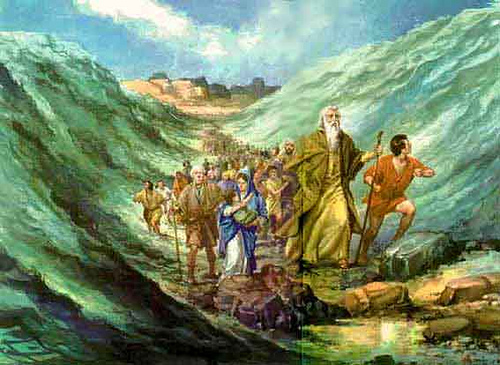The first six books of the Old Testament (Genesis, Exodus, Leviticus, Numbers, Deuteronomy and Joshua) trace the story of the people of Israel from the creation of human beings through their pre-history until they become settled in the land of Canaan.
The story begins with the accounts of creation (Gen. 1.1-2.4a; Gen. 2.4b-25). The creation stories are mythological accounts of how the world came to be the way it is. The notion that these stories should be understood literally is a very modern one. The ancient people who told these stories understood much better how such myths function than we do today. These stories have many features in common with similar creation myths from other ancient near Eastern cultures. In the form in which we find them in the Bible they have been edited and rewritten, perhaps many times, and reveal a religious system much more sophisticated than that in which they originated.
The book of Genesis begins the story of the pre-history of Israel. The stories of Adam and Eve tell how the division between humanity and God came about (Gen. 3). The story of Cain and Abel (Gen. 4) tells how enmity between peoples comes to exist. Noah’s story (Gen. 6.5-9.29) refers to a very ancient creation myth (the flood) and the origin of the nations known to the Israelites (Gen. 10). Ham – ancestor of the nations to the South; Japheth – ancestor of the nations to the North and West; Shem – ancestor of the Semite nations from the near East including Israel itself.
The story continues with the accounts of the lives of the Patriarchs – Abraham, Isaac and Jacob. Abraham, like his son and grandson is a nomad. It is to Abraham that the promises are made that he will become a great nation, even though he and his wife Sarah are past the age of childbearing, and that his descendants will possess the land of Canaan as their homeland (Gen. 17). The miraculous birth of Isaac to Sarah in her old age reinforces the notion of Israel as God’s chosen people. Jacob’s story reveals how the people of Israel came to have that name (Gen. 32.22-33) and how they came to be in Egypt (Gen. 37.2-46.34). Jacob’s sons are the eponymous ancestors of the Twelve Tribes of Israel.
The life of Moses and the story of the Exodus are told in the book of that title, and in the three following books, Leviticus, Numbers and Deuteronomy. It is the story of how Egypt’s Pharaoh was persuaded to let the people of Israel leave (Ex. 5-12). The crossing of the Red Sea is a key moment for Israel as it becomes a symbol of God’s faithfulness in delivering them from slavery (Ex. 14). There follows an account of their forty year journey to Canaan the land of the promise to Abraham. It is has many miraculous features – the plagues in Egypt, the crossing of the Red Sea, the supplying of manna (Ex. 16), the healing of the Israelites bitten by snakes (Num. 21.4-9).
Alongside the stories of the journey are accounts of the giving of the Law to the people through Moses. The Ten Commandments (Ex. 20.1-17; Deut. 5.1-21) are well known but there is a huge body of law. In receiving the Law Moses met face to face with God (Ex. 19.3-15 et al) for which reason he is known as the greatest of all the prophets.
The book of Joshua is an account of the colonisation of the land of Canaan by the Israelites who are led by Joshua following the death of Moses on the borders of Canaan. Parts of it make difficult reading to the modern eye – the story is not one of a peaceful integration and it is hard to read it and not bring to mind modern episodes of ethnic cleansing. Later stories make clear that the original inhabitants were not wiped out as the book of Joshua suggests and the stories are possibly related in this way to emphasise how the land they are settling in is the land that Abraham was promised by God.
The story of the Exodus and the settling in the promised land is also a story of transition from being a nomadic people to becoming a nation with cities, an agrarian economy and a new identity. The giving of the Law is a crucial element of that story.
It is after these stories that we move from Israel’s pre-history to history.
